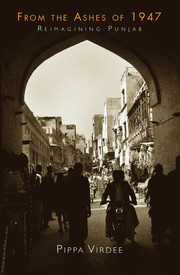Book contents
- Frontmatter
- Contents
- List of Photographs
- List of Maps and Tables
- List of Excerpts
- List of Abbreviations
- Glossary
- Acknowledgements
- Preface: Memories Create History
- 1 Partitioned Lands, Partitioned Histories
- 2 The Treasure within the Five Rivers
- 3 Handing Over the Reigns
- 4 Violence, Migration and the Making of the Refugee
- 5 Sacred Malerkotla
- 6 Migrating to the Promised Land: A Tale of Two Cities
- 7 From Refugee to Citizen
- 8 Cleansing Hearts and Minds
- 9 Lost Innocence and Sold Honour
- 10 Dreams, Memories and Legacies
- Select Bibliography
- Index
1 - Partitioned Lands, Partitioned Histories
Published online by Cambridge University Press: 05 July 2018
- Frontmatter
- Contents
- List of Photographs
- List of Maps and Tables
- List of Excerpts
- List of Abbreviations
- Glossary
- Acknowledgements
- Preface: Memories Create History
- 1 Partitioned Lands, Partitioned Histories
- 2 The Treasure within the Five Rivers
- 3 Handing Over the Reigns
- 4 Violence, Migration and the Making of the Refugee
- 5 Sacred Malerkotla
- 6 Migrating to the Promised Land: A Tale of Two Cities
- 7 From Refugee to Citizen
- 8 Cleansing Hearts and Minds
- 9 Lost Innocence and Sold Honour
- 10 Dreams, Memories and Legacies
- Select Bibliography
- Index
Summary
Defining the post-1947 relationship between India and Pakistan, and given that seventy years have lapsed, the partition of British India in August 1947 remains a watershed in the subcontinent's history. Underlying this is the juxtaposition of Jawaharlal Nehru's famous ‘Tryst with Destiny’ speech on the eve of independence, and the millions of people in Punjab who woke up not knowing which country they belonged to. The jubilation of independence was simultaneously marked by carnage, and so the memory of decolonisation/ independence/partition varies greatly, depending on which side of the border you were, where you were within that, and who you were as an individual. How have historians captured these experiences and voices?
The actual event or process was marked by one of the greatest migrations in the twentieth century, resulting in approximately 14.5 million people being forced to cross the newly created borders of India and Pakistan. The majority of these people came from Punjab, Sind, North-West Frontier Province and Bahawalpur state on the Pakistani side and from East Punjab, the East Punjab princely states, Delhi and United Provinces on the Indian side. Migration in Bengal was on a much smaller scale in August 1947, although, unlike in Punjab, it was drawn out for many years. The communal violence, which prompted this mass movement, resulted in an estimated death of one million people. This figure continues to be a contentious issue and will be examined in greater detail in chapter four. The migrants experienced intense trauma arising from the loss of property and family members, and, as a result, of being forcibly exiled from their ancestral homes and lands. Sadly, even today, families bear the physical and psychological scars of this forced migration that was accompanied by reprehensible violence and crimes that, as a society, we have not been able to fathom.
Writing Partition History
The celebratory spirit of hard-fought freedom has largely defined much of the official histories produced in India, Pakistan and Britain,4 and at the same time they have played down the disruption, dislocation and ordeals inflicted on ordinary people effected by Partition. The colonial interpretation is generally viewed through the successful transfer of power rather than the success of the freedom movement.
- Type
- Chapter
- Information
- From the Ashes of 1947Reimagining Punjab, pp. 2 - 19Publisher: Cambridge University PressPrint publication year: 2017



